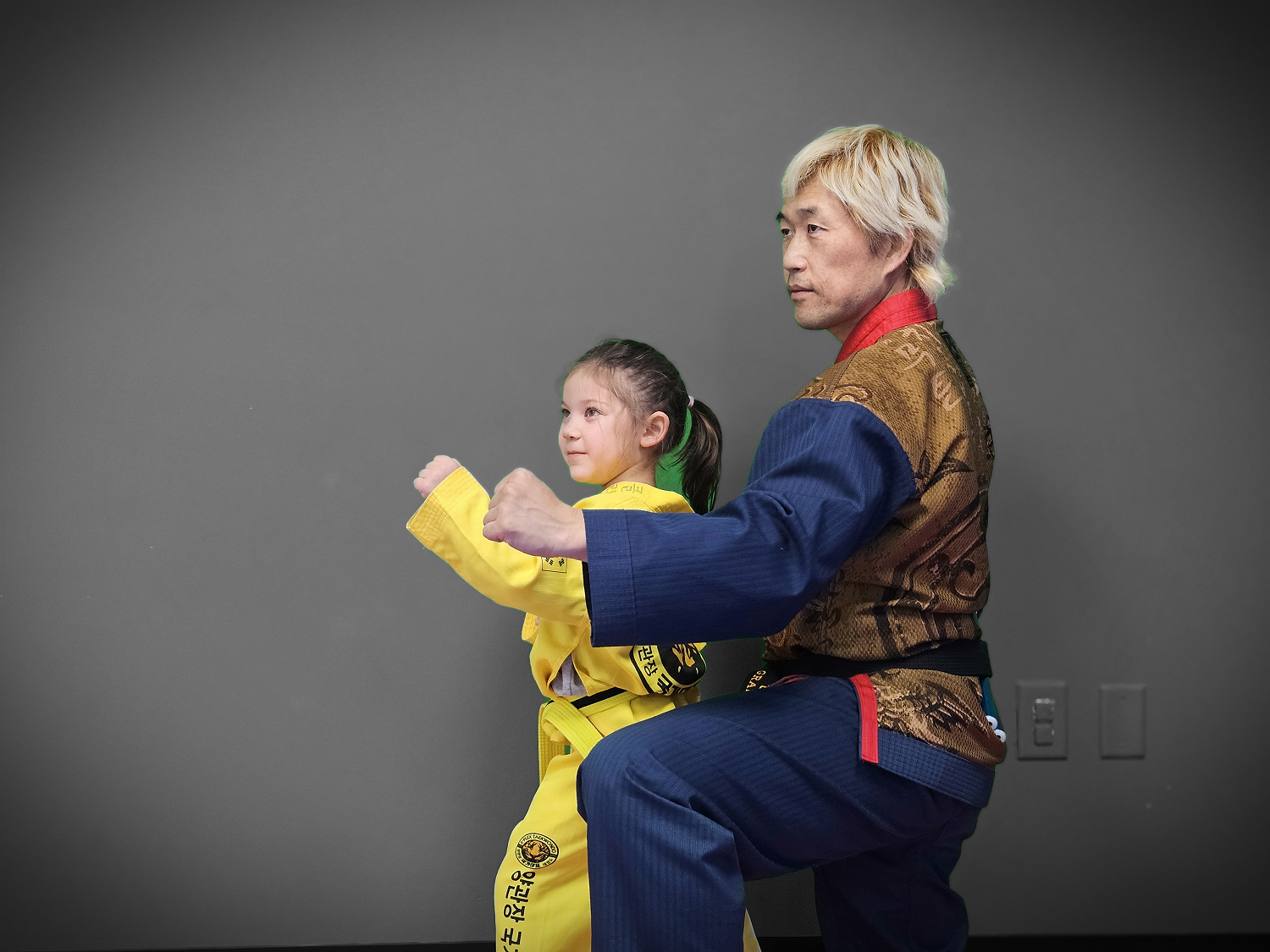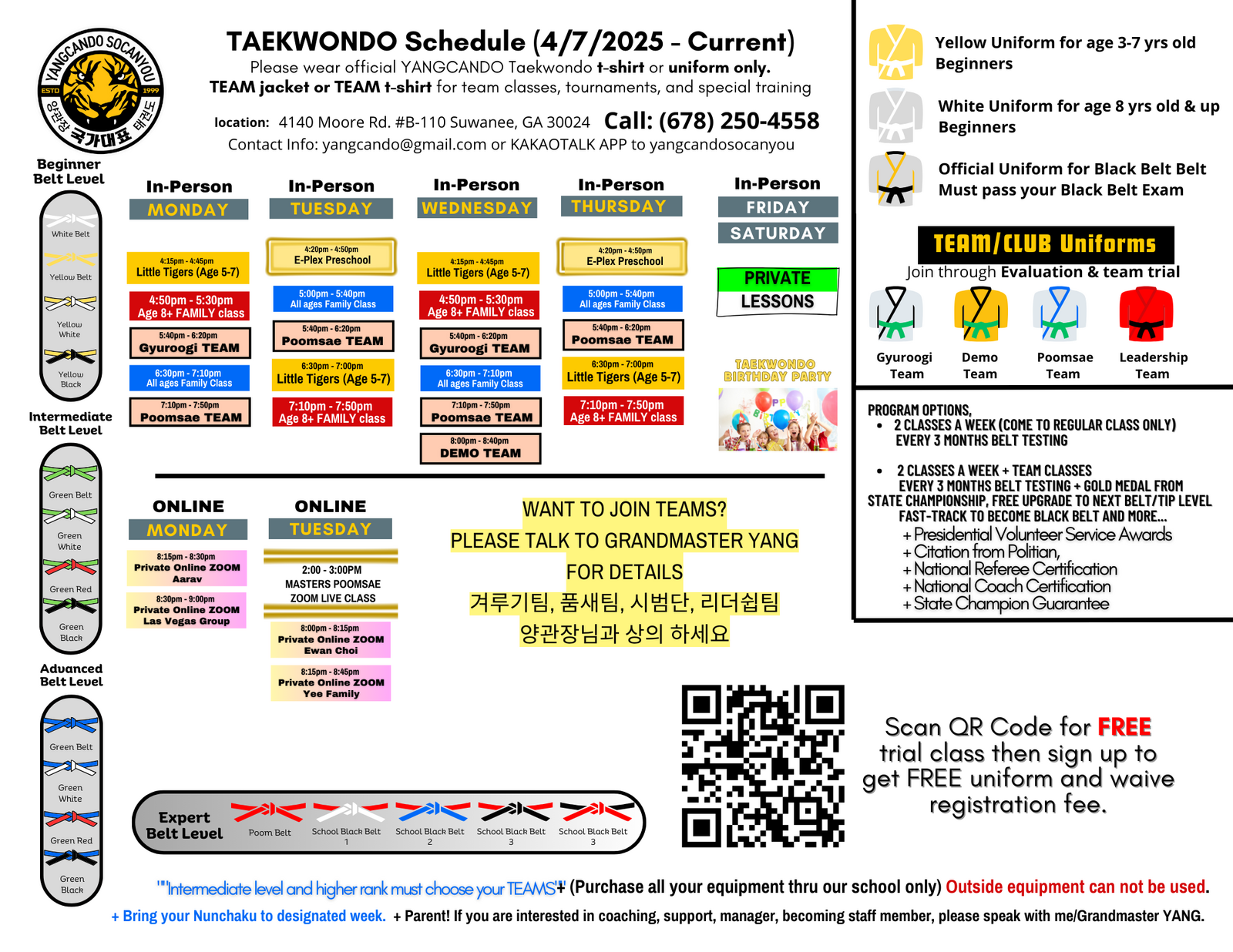Welcome
5
Instructors100+
Students500+
Awards Won44+
Years ExperienceTaekwondo
Taekwondo, the ancient Korean martial art, offers a holistic approach to physical and mental development. With its emphasis on powerful kicks, precise strikes, and flowing forms, Taekwondo provides a full-body workout that enhances strength, flexibility, and cardiovascular health. But there's more to Taekwondo than just physical fitness.
As you progress through the ranks, you'll develop discipline, focus, and a deep sense of self-awareness. The art of Taekwondo teaches you to respect yourself and others, fostering a strong sense of community and camaraderie. Whether you're seeking self-defense, stress relief, or a new challenge, Taekwondo offers something for everyone.
Benefits of Taekwondo:
- Physical fitness: Improved strength, flexibility, coordination, and cardiovascular health
- Self-defense: Effective techniques for personal safety
- Mental discipline: Enhanced focus, concentration, and stress management
- Confidence: Increased self-esteem and belief in your abilities
- Character development: Cultivates respect, perseverance, and leadership qualities
- Cultural enrichment: Connects you to a rich martial arts tradition
Join us today and discover the transformative power of Taekwondo.

Why Choose YANGCANDO TAEKWONDO?
Whether you're a beginner seeking a new challenge or an experienced martial artist looking to refine your skills, YANGCANDO offers a supportive and inspiring environment tailored to your individual needs. Our expert instructors are dedicated to helping you achieve your goals, whether it's improving your fitness, boosting your confidence, or developing self-defense skills. Join our vibrant community and discover the transformative power of Taekwondo. Empower yourself. Unleash your potential."
Trusted By Our Members
Frequently Asked Questions
Check out the most frequently asked questions about YANGCANDO TAEKWONDO.
Still haven't found the answer?
Contact UsWhy Senior Citizens Can Benefit From Martial Arts?
Martial Arts: A Holistic Approach to Senior Wellness
As individuals age, they often seek ways to maintain their quality of life and remain active. Martial arts offer a comprehensive approach to senior wellness, providing both physical and mental benefits.
Mental Acuity and Focus
Martial arts training demands concentration, quick decision-making, and memory recall. These cognitive challenges help stimulate the brain, potentially mitigating age-related cognitive decline. Regular practice can enhance focus, problem-solving skills, and overall mental sharpness.
Social Connection and Community
Martial arts classes foster a sense of camaraderie and belonging. Training partners and fellow students create a supportive community where seniors can connect, share experiences, and build lasting friendships. This social interaction is essential for emotional well-being and can help combat feelings of isolation.
Physical Fitness and Strength
Martial arts incorporate a variety of exercises that target different muscle groups, improving strength, flexibility, and balance. Regular practice can help prevent falls, reduce the risk of injuries, and enhance overall physical function. Additionally, the cardio component of martial arts training can improve heart health and stamina.
Self-Defense and Confidence
Learning self-defense skills can boost confidence and provide a sense of security. Martial arts empower seniors to take control of their safety and feel more independent. The discipline and self-control instilled through training can also translate to other areas of life.
Conclusion
Martial arts offer a holistic approach to senior wellness, addressing both physical and mental health. By incorporating regular martial arts training into their lifestyle, seniors can improve their overall quality of life, maintain independence, and enjoy a more fulfilling retirement.
Protect Your Heart with Martial Arts
Martial Arts: A Heart-Healthy Workout
February is American Heart Month, a time to raise awareness about heart health and disease prevention. While many people are familiar with traditional cardiovascular exercises like running and swimming, martial arts offer a unique and effective way to improve heart health.
Enhanced Cardiovascular Fitness
Martial arts training is a high-intensity workout that elevates your heart rate, leading to increased cardiovascular fitness. This improved heart function can lower blood pressure, reduce the risk of heart disease, and enhance overall health.
Improved Cholesterol Levels
Regular martial arts practice can help lower LDL ("bad") cholesterol levels and increase HDL ("good") cholesterol levels. This favorable cholesterol profile is essential for heart health.
Stress Reduction and Mental Well-being
Martial arts training combines physical exertion with mental focus and discipline. This combination can reduce stress, anxiety, and improve overall mental well-being. Stress reduction is crucial for heart health, as chronic stress can contribute to high blood pressure and other cardiovascular problems.
Additional Benefits
Beyond the cardiovascular benefits, martial arts training offers numerous other advantages, including:
- Improved balance and coordination: Essential for preventing falls and injuries.
- Increased strength and flexibility: Helps maintain overall physical health.
- Enhanced self-defense skills: Provides a sense of security and empowerment.
- Improved self-discipline and focus: Can benefit other areas of life.
Conclusion
Martial arts offer a comprehensive approach to heart health, combining cardiovascular exercise, stress reduction, and mental well-being. By incorporating martial arts training into your routine, you can significantly improve your heart health and overall quality of life.
The Positive Effects of Martial Arts for a Child in School
Martial Arts: Empowering Children to Thrive in School
School can be a challenging and formative experience for children. Martial arts provide a valuable tool for helping young people navigate the social and academic aspects of education. By developing essential skills like discipline, self-confidence, and social skills, martial arts can empower children to thrive in the classroom and beyond.
Academic Success and Focus
Martial arts training instills discipline, focus, and a strong work ethic. These qualities are essential for academic success, as they enable children to concentrate on their studies, complete assignments on time, and manage their workload effectively. The structure and routine of martial arts classes can also help children develop time management skills and prioritize their tasks.
Building Confidence and Resilience
Martial arts empower children to overcome challenges and build resilience. By learning self-defense techniques and developing physical strength, children gain confidence in their abilities. This newfound confidence can help them stand up to bullies, assert themselves in social situations, and approach academic challenges with a positive mindset.
Developing Social Skills
Martial arts classes provide opportunities for children to interact with peers in a supportive and collaborative environment. Through teamwork, shared experiences, and friendly competition, children learn valuable social skills like communication, cooperation, and respect. These skills can help them build strong friendships, resolve conflicts peacefully, and navigate social situations with confidence.
Conclusion
Martial arts offer a comprehensive approach to child development, providing both physical and mental benefits. By equipping children with essential skills like discipline, self-confidence, and social skills, martial arts can empower them to succeed in school and lead fulfilling lives.
Schedule

